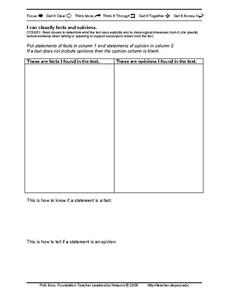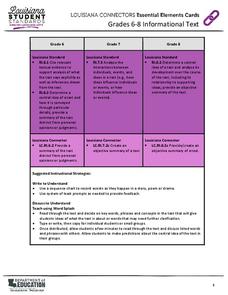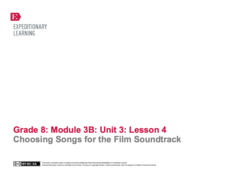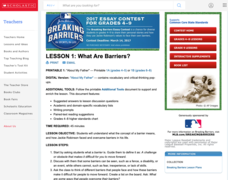Polk Bros Foundation
Common Core Constructed Response Organizer
Get your writers ready to compose a constructed response essay in response to either an informational or fictional text. Pupils note down the big idea they wish to address as well as up to nine examples from the text that they wish to...
Polk Bros Foundation
How to Summarize a Non-Fiction Passage
After reading a text, one way to find out how much your class comprehended is to ask your pupils to summarize. This worksheet helps class members prepare for writing a summary of a nonfiction text. They note down the topic, up to eight...
K12 Reader
The Apprentice System
Readers are asked to identify the central idea and two supporting details that develop this main idea in an article about the apprentice system popular in colonial America.
Curated OER
Persuasive Speech Assignment
Practice using concrete evidence from various sources to back up an argument. The lesson emphasizes the use of support in a persuasive speech, as well as the importance of appealing to an audience's logic and emotions. You could modify...
Polk Bros Foundation
I Can Classify Facts and Opinions
Telling fact from opinion can be tricky. Direct your class to practice their reading and comprehension skills by taking notes on the facts and opinions in a text. Pupils fill out a two-column chart and write down how they know a...
K12 Reader
What is a Tribal Government?
How are tribal governments similar to local or state governments? After reading a short article on tribal governments, individuals draw evidence from the provided article to respond to this reading comprehension question.
iCivics
Drafting Board: Military Intervention
Should countries use their militaries to stop humanitarian crises in other countries? Learners make claims, organize their reasoning, and provide evidence for their arguments with this rich resource.
Louisiana Department of Education
Essential Elements Cards
Use essential elements cards to help lesson plan! Each card contains an informational text common core standard for grade levels six through eight and suggestions for activities and supports. Cards address skills such as citing textual...
iCivics
Drafting Board: Community Service
Should schools impose community service graduation requirements? In the final lesson of the Drafting Board series, learners solidify their practice of crafting an argument supported by sound reason and evidence.
iCivics
We the Jury
Learners take on the roles of jurors in a civil case to evaluate evidence and determine a verdict in this engaging online interactive experience.
EngageNY
End of Unit Assessment Parts 1 and 2: Evaluating Arguments and Claims
Which came first: the chicken or the egg? As part of the end-of-unit assessment for The Omnivore’s Dilemma, scholars watch a video about organic eggs versus conventional farm eggs. They use graphic organizers to collect evidence as they...
EngageNY
Close Reading: Louie’s Change of Heart
Scholars read additional pages in Unbroken to discover more about Louie's character. Readers use turn-and-talk strategies to discuss character traits that describe Louie. They then answer text-dependent questions and cite evidence to...
EngageNY
Choosing Songs for the Film Soundtrack
Music has the power to bring topics alive. Learners take on the role of sound director in their film planning and choose the songs to accompany their photographs. They must also support their decisions with evidence and reasoning as they...
EngageNY
Evaluating an Argument: The Polyface Local Sustainable
Who has the better argument? Class members work in small groups to compare the arguments on the Example of Strong and Flawed Arguments sheet. They then analyze Michael Pollan’s argument on pages 161–166 of The Omnivore’s Dilemma and...
K12 Reader
Hide and Seek
After examining a brief article about survival adaptations, readers identify the main idea of the passage and list two supporting details.
EngageNY
Reading for Gist, Answering Text-Dependent Questions, and Determining Author’s Purpose: Industrial Organic Food Chain
After re-reading The Omnivore’s Dilemma using a Reading Closely: Guiding Questions handout, class members use sticky notes to annotate and determine the gist of the text. Finally, they use an Author’s Purpose graphic organizer to...
Odell Education
Reading Closely For Textual Details: Grade 8
Only a thorough understanding of history can save us from repeating it. Practice close reading skills with an eighth grade unit that focuses on 19th century America, including European immigration into Ellis Island and Frederick...
Scholastic
Lesson 1: What Are Barriers?
Scholars discuss the concept of a barrier with a short passage on Jackie Robinson. The writing process begins with a paragraph and several other sentences about Robinson's unique traits that made breaking a barrier possible.
EngageNY
Mid-Unit Assessment: On-Demand Writing – Conflicting Interpretations of the 13th and 14th Amendments
The authors of the court's decision and the dissenting opinion on Plessy v. Ferguson disagreed on their interpretations of the Thirteenth and Fourteenth Amendments. Scholars set out to show how with an on-demand writing prompt. They...
Newseum
Things Change, Things Stay the Same
Securing women the right to vote was a long time coming. Over the years, some aspects of the suffrage movement changed, and some things remained the same. Pupils research three time periods and collect evidence of key people, strategies,...
National Endowment for the Humanities
Harriet Jacobs and Elizabeth Keckly: The Material and Emotional Realities of Childhood in Slavery
Young historians learn how to make generalizations based on primary sources in a instructional activity that uses the autobiographies of two women born into slavery. The class watches a historical re-enactment of scenes from the lives of...
Polk Bros Foundation
I Can Identify/Infer Motive
Why do people and characters act as they do? Require your class figure out the motivation of two people or characters they read about in a given text. In the short charts, pupils note down who, what they do, and why they do it. After...
Polk Bros Foundation
I Can Sequence Important Events
After reading any short informational or fictional text, ask your class to analyze the important events. They note down three important events on a short timeline, describing the events with either words or drawings. After this, pupils...
Baruch College Writing Center
Summarizing, Paraphrasing, and Quoting Workshop
What's the difference between summarizing and paraphrasing? Show class members how to find the main ideas from informational text and condense it, restate it, or quote it directly with a series of educational activities based on two...

























